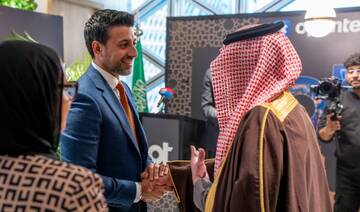VIENNA: OPEC moved closer on Friday toward boosting oil output as its leader Saudi Arabia appeared to have persuaded arch-rival Iran to cooperate, after major consumers warned of a supply shortage.
Saudi Arabia and non-OPEC Russia have said a production increase of about 1 million barrels per day (bpd) or around 1 percent of global supply had become a near-consensus proposal for the group and its allies.
The Organization of the Petroleum Exporting Countries is gathering in Vienna amid calls from the United States, China and India to cool down the price of crude and prevent an oil deficit that would hurt the global economy.
OPEC in theory needs the agreement of all members to clinch a deal but has in the past agreed production pacts without Iran, which has criticized the idea of raising supply as it faces export-crippling US sanctions.
“We are cooking something,” Iranian Oil Minister Bijan Zanganeh told reporters after meeting Saudi Energy Minister Khalid Al-Falih before the OPEC talks.
Iran, OPEC’s third-largest producer, has so far been the main barrier to a deal as it called on OPEC to reject pressure from US President Donald Trump to pump more oil.
Trump imposed fresh sanctions on Tehran in May and market watchers expect Iran’s output to drop by a third by the end of 2018. That means the country has little to gain from a deal to raise OPEC output, unlike top oil exporter Saudi Arabia.
Falih said the overwhelming majority of producers had recommended raising output by 1 million bpd, gradually and on a pro-rata basis.
OPEC and its allies have since last year been participating in a pact to cut output by 1.8 million bpd. The measure has helped rebalance the market in the past 18 months and lifted oil to around $74 per barrel from as low as $27 in 2016.
But unexpected outages in Venezuela, Libya and Angola have effectively brought supply cuts to around 2.8 million bpd in recent months.
Brent oil prices were up 1.8 percent on Friday.
OPEC has a history of difficult meetings as well as clashes between Iran and Saudi Arabia.
In 2000, then-US President Bill Clinton’s energy secretary, Bill Richardson, phoned Ali Al-Naimi, the Saudi oil minister at the time, during an OPEC meeting to ask for more oil.
The move infuriated Iran, and Zanganeh refused to sign up to the meeting’s decision to raise output. The dispute was settled by the time of the next OPEC talks.
The current standoff was partially triggered by the United States, with Trump calling directly on OPEC to raise output.
Falih has warned the world could face a supply deficit of up to 1.8 million bpd in the second half of 2018 and that OPEC’s responsibility was to address consumers’ worries.
“We want to prevent the shortage and the squeeze that we saw in 2007-2008,” Falih said, referring to a time when oil rallied close to $150 per barrel.
Earlier this week, Zanganeh left the door open for a deal, saying OPEC members that had overdelivered on cuts in recent months should comply with agreed quotas. That would effectively mean a modest boost from producers such as Saudi Arabia that have voluntarily cut more deeply than planned.
Zanganeh has said that if OPEC returned to regular compliance, the group would raise output by around 460,000 bpd.
On Friday, Zanganeh said OPEC would change the structure of the current deal, but declined to elaborate.
Falih also said the real increase would be smaller than the nominal gain of 1 million bpd, meaning a compromise with Iran remained possible. He said OPEC could meet again in September to adjust the deal.
OPEC sources also said Iran had demanded that US sanctions be mentioned in the group’s post-meeting communique, as Tehran has blamed US measures for the recent rise in oil prices.
The United States, which rivals Russia and Saudi Arabia for the position of world No.1 oil producer, is not participating in the current supply pact.















